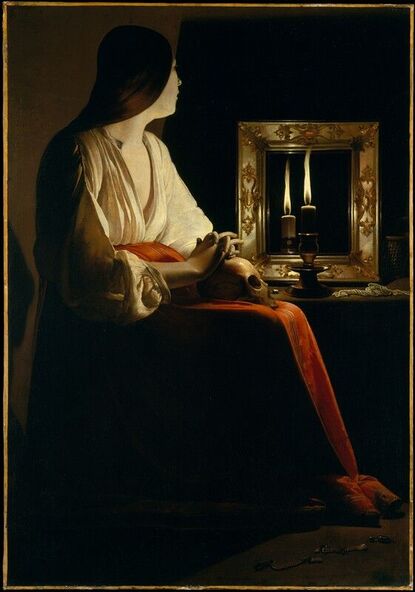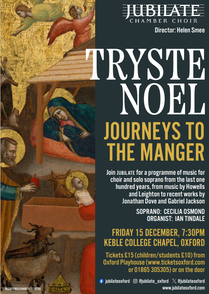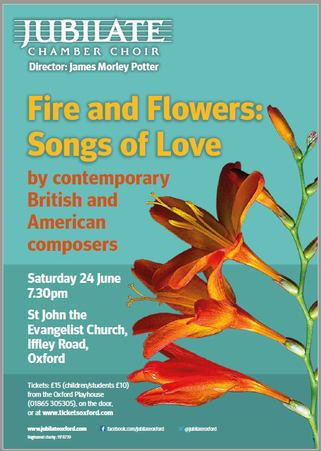|
Tryste Noel: Journeys to the Manger
Friday 15th December 2023, Keble College, Oxford Helen Smee led JUBILATE in a rich programme of Christmas music for choir and solo soprano by poets and composers of the last 100 years. We sang music by Howells and Leighton as well as more recent works by Jonathan Dove and Gabriel Jackson. The audience joined in the singing for the better known carols in the splendid candle-lit surroundings of Keble College Chapel. This concert was our first directed by our new conductor, Helen Smee. We were also joined by Cecilia Osmond (soprano) and Ian Tindale (organ). |
|
Fire and Flowers: Songs of Love
Saturday 24th June 2023, St. John the Evangelist Church, Oxford A summery feast of sumptuous a cappella music, this concert drew together 20th and 21st century settings of secular poetry, from heart-on-sleeve Whitacre, to the intensity of Lauridsen’s ‘Fire Madrigals’, finishing with Philip Glass in typically propulsive and unconventional mood. Along the way, we featured recent, rapturous sets of love songs by contemporary British composers David Bednall and Owain Park. |
 The Penitent Magdalen by Georges de la Tour, The Metropolitan Museum of Art, New York, is licensed under CC0
The Penitent Magdalen by Georges de la Tour, The Metropolitan Museum of Art, New York, is licensed under CC0
Music for a Time of Penitence
Saturday 25th March 2023, Christ Church, Oxford
directed by James Morley Potter
with
Peter Harris (tenor) and
Steven Grahl (organ)
The season of Lent brings on choral music's long dark night of the soul, characterised sometimes by tortuous intensity, sometimes by deep introspection. And while this has been the case since the earliest days of Western sacred music, perhaps the twentieth century added a certain eschatalogical edge to the penitential season, as the world came to germs with the horrors of modern warfare. However, along with the great lows come glorious highs - the anticipation of Easter, and the sense that the night is darkest before the dawn.
This Lenten programme focused on music from the mid-twentieth century, full of passion and expressive power. Poulenc’s four motets, composed in the years leading up to the Second World War, are poised, intense, and chilly. Leighton’s multi-movement work Crucifixus pro nobis is angular and austerely beautiful, concluding with the mesmeric Drop, slow tears. In the second half, the German composer Rudolf Mauersberger uses the Biblical destruction of Jerusalem as a way to explore his grief over the bombing of Dresden. This all leads up to the extraordinary Quia amore langueo, by British composer Howard Ferguson. A fourteenth-century lyric dramatizes the love of Christ for humanity using the potent imagery of medieval courtly romance. It’s regarded as one of the finest medieval poems to come down to us. Ferguson answers it with music of equal potency, with luscious choral writing and ardent tenor solos – an underrated twentieth-century masterpiece.
Francis Poulenc Quatre motets pour un temps de penitence
Kenneth Leighton Crucifixus Pro Nobis
Rudolf Mauersberger Wie liegt die Stadt so wust
Howard Ferguson Quia amore langueo
Saturday 25th March 2023, Christ Church, Oxford
directed by James Morley Potter
with
Peter Harris (tenor) and
Steven Grahl (organ)
The season of Lent brings on choral music's long dark night of the soul, characterised sometimes by tortuous intensity, sometimes by deep introspection. And while this has been the case since the earliest days of Western sacred music, perhaps the twentieth century added a certain eschatalogical edge to the penitential season, as the world came to germs with the horrors of modern warfare. However, along with the great lows come glorious highs - the anticipation of Easter, and the sense that the night is darkest before the dawn.
This Lenten programme focused on music from the mid-twentieth century, full of passion and expressive power. Poulenc’s four motets, composed in the years leading up to the Second World War, are poised, intense, and chilly. Leighton’s multi-movement work Crucifixus pro nobis is angular and austerely beautiful, concluding with the mesmeric Drop, slow tears. In the second half, the German composer Rudolf Mauersberger uses the Biblical destruction of Jerusalem as a way to explore his grief over the bombing of Dresden. This all leads up to the extraordinary Quia amore langueo, by British composer Howard Ferguson. A fourteenth-century lyric dramatizes the love of Christ for humanity using the potent imagery of medieval courtly romance. It’s regarded as one of the finest medieval poems to come down to us. Ferguson answers it with music of equal potency, with luscious choral writing and ardent tenor solos – an underrated twentieth-century masterpiece.
Francis Poulenc Quatre motets pour un temps de penitence
Kenneth Leighton Crucifixus Pro Nobis
Rudolf Mauersberger Wie liegt die Stadt so wust
Howard Ferguson Quia amore langueo
To receive email updates on future concerts, please consider joining JUBILATE's mailing list.



